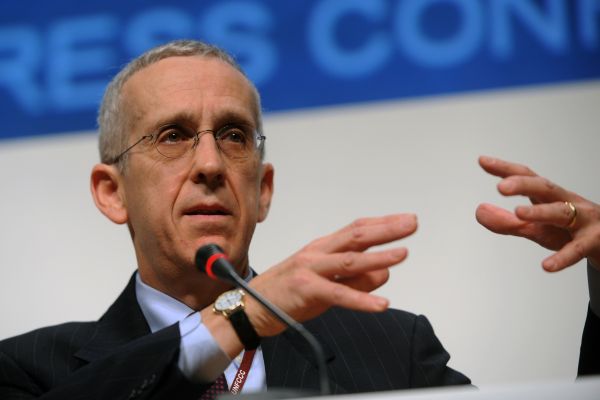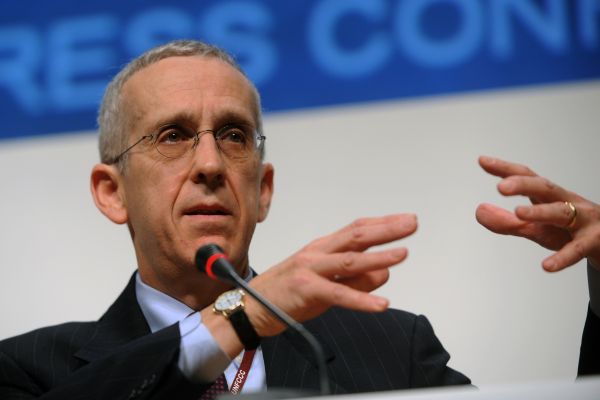 U.S. Climate Envoy Todd Stern.A month after he rode herd at Copenhagen’s COP15 climate talks, Todd Stern is exhorting participants to make the outcome of the conference meaningful. “Life needs to be breathed into the Copenhagen Accord,” the State Department’s special envoy for climate change tells Grist. He insists that the three-page document represents a “very, very important step forward,” and he’s now pushing major developed and developing countries to make clear public pledges for reductions in emissions or energy intensity by a Jan. 31 deadline, to substantiate the Accord.
U.S. Climate Envoy Todd Stern.A month after he rode herd at Copenhagen’s COP15 climate talks, Todd Stern is exhorting participants to make the outcome of the conference meaningful. “Life needs to be breathed into the Copenhagen Accord,” the State Department’s special envoy for climate change tells Grist. He insists that the three-page document represents a “very, very important step forward,” and he’s now pushing major developed and developing countries to make clear public pledges for reductions in emissions or energy intensity by a Jan. 31 deadline, to substantiate the Accord.
But even as he touts the successes of the Copenhagen conference, Stern is tamping down expectations that a legally binding global climate treaty will be reached at the next big climate meeting, COP16 in Mexico in December 2010: “there’s a fair amount of distance between where we are now and then.”
Stern also talks candidly about his qualms with the U.N. conference process. “You can’t negotiate in a group of 192 countries. It’s ridiculous to think that you could,” he says, while also stressing that “it is certainly premature to write off” the U.N. process. His concerns echo those of his colleague Jonathan Pershing, who argued last week for a focus on a narrower group of negotiating countries rather than the U.N.’s everybody-in approach: “We expect there will be significant actions recorded by major countries,” Pershing said. “We are not really worried what Chad does. We are not really worried about what Haiti says it is going to do about greenhouse-gas emissions. We just hope they recover from the earthquake.”
I spoke to Stern, formerly an advisor to President Bill Clinton and senior counsel to Sen. Patrick Leahy, in a stark, fluorescent-lit conference room at the State Department to get his take on the ups and downs at Copenhagen and what to expect on climate policy in 2010.
—-
Q. What was the most gratifying moment for you in the morass of Copenhagen?
A. Getting the thing done. And being part of what President Obama and Secretary Clinton brought to it, because they were instrumental to that moment of getting [the Copenhagen Accord] done.
Q. Can you set the scene of that moment?
A. It was literally the 11th hour, 11:30 p.m. Thursday [before the last scheduled day of the conference]. A lot of leaders including Secretary Clinton came together in a room — it was a pretty extraordinary tableau. You had Gordon Brown [prime minister of the U.K.] and Angela Merkel [chancellor of Germany] and Kevin Rudd [prime minister of Australia] and Nicolas Sarkozy [president of France] and Lula [president of Brazil] and Jacob Zuma [president of South Africa] and Mohamed Nasheed [president of the Maldives] and Meles Zenawi [prime minister of Ethiopia] and everybody sitting around this table. It was an up-and-down process over the course of 20 hours or so, but eventually the leaders are rolling up their sleeves and negotiating language of this thing back and forth, completely unscripted. That’s not the way presidents and prime ministers generally go into meetings these days.
It was quite an impressive and successful performance by Secretary Clinton and then by President Obama, who arrived on Friday morning.
Q. What was your most frustrating moment in Copenhagen?
A. There were so many to choose from. It was a very difficult conference — constant procedural wrangling, constant tie-ups, repeated efforts by various parties to try to get the main players — including those representing smaller and poorer countries — to engage on the main issues. There were any number of times when the effort to engage on the issues got procedurally blocked.
Q. Describe the procedural blocks.
A. You can’t negotiate in a group of 192 countries. It’s ridiculous to think that you could. And yet when Denmark [the nation chairing the conference] would over and over again try to pull together some group based on each country bloc choosing their own representatives, not in any way cherry-picking who was going to be in, some parts of the developing-country groups would block it.
Q. How would you rate the success of Copenhagen on a scale of one to ten?
A. I’m not going to give you a number. I think it was a very, very important step forward, and actually quite a good accord, given what it includes on mitigation, transparency, funding for poor countries, and technology.
Q. What’s your response to the widespread criticism of the outcome?
A. People seem to forget that just 36 hours before the conference was set to end, we were headed for collapse. Instead, we got this three-page document. It isn’t everything that people wanted, but it includes meaningful elements.
Q. Do you agree with the perception that China stalled and blocked at COP15?
A. I don’t want to try to characterize whether they were blocking or not. I think they had certain objectives in mind, which were not necessarily the same as ours. But at the end of the day I think Chinese Premier Wen Jiabao and President Obama, along with the other leaders, found a pretty good common-ground position.
Q. There’s a lot of speculation that the UNFCCC [U.N. Framework Convention on Climate Change, the foundational climate treaty] is fundamentally ineffective. Do you think it has a future? Are there more effective forums for negotiating climate treaties, like the G20 or the Major Economies Forum?
A. When we first came to the table a year ago, we felt that it would be important to have a smaller set of countries that could be not negotiating the text of the agreement but discussing views on the big issues and working on some technology stuff. You can’t effectively negotiate unless you have the capacity to work in a smaller representative group where you can have a discussion that doesn’t occur in a much larger group.
Q. What would the smaller set of countries be?
A. The Major Economies Forum last year was 18 countries and served a real purpose. You had the same set of people that met virtually every month and there’s a certain level of trust and camaraderie that builds up. The group of countries that came together at the UNFCCC on that Thursday night into Friday was 28 or so — mostly the MEF countries with some others like Ethiopia, Granada, and Bangladesh.
I’m not sure whether we’ll negotiate in the MEF context or what the smaller group process is going to be this year, but there certainly needs to be one. The UNFCCC is an organization that has some historical credibility, but it had a lot of problems in Copenhagen — many days of potentially negotiating and making progress that just got locked up.
Q. Could you have definitive success without the UNFCCC? Could the smaller groups alone produce a meaningful outcome?
A. It is certainly premature to write off the UNFCCC. There is a credibility that is provided by the full group. So on the one hand, I don’t think you can negotiate in that grouping, but on the other hand, it’s good for there to be a larger grouping that the smaller representative group can come back to.
Some of the rules [of the UNFCCC] can be difficult. If you’ve got 185 countries wanting to do something and a handful that don’t want to, that blocks everything.
Q. In the ten months leading up to COP16 in Mexico, what needs to happen?
A. Life needs to be breathed into the Copenhagen Accord. The formal adoption of this accord by the COP was blocked by Cuba, Nicaragua, five or six countries, and the ultimate decision was to take note of the thing as opposed to adopt it. So there’s a process going on now where countries need to associate themselves, affirmatively tell the UNFCCC secretariat that they want to be part of this.
Step No. 2 is that the major developed and developing countries decide to list or inscribe their targets or actions. That’s supposed to happen by the end of the month. If a month from now all of that’s happened, the plane will have taken off from the runway.
In addition, the Copenhagen Accord includes a number of important elements that need to get fleshed out more. There’s a provision to set up a new global climate fund [to help vulnerable developing nations]. There’s a provision to set up a new technology body. There’s some good language on transparency and verification, and a provision for that to be further spelled out in guidelines. I would hope that gets worked on this year.
And there will be efforts to press forward toward a legal treaty, presumably by COP16 or perhaps thereafter.
Q. What realistically do you expect to come out of Mexico?
A. I think that you could have decisions made to further implement the Copenhagen Accord. And the maximum amount of progress toward a legal agreement — and maybe even all the way there. But there’s a fair amount of distance between where we are now and then.
Q. So it’s hard to expect anything out of COP16?
A. No, no, I’m not saying that at all. The objective should be this year to flesh out and implement the Copenhagen Accord. And we should be working toward a legal agreement in addition.
Q. What happens if we don’t see progress toward climate action in the U.S. Senate? And if the EPA’s authority to regulate CO2 is blocked? What would a double-whammy failure in U.S. domestic policy mean for COP16?
A. I’m not going to speculate on stuff like that. I don’t think that the EPA authority is going to be stripped away, and I’m hopeful with respect to domestic legislation. I think the partnership between Sen. John Kerry [D-Mass.] and Sen. Lindsey Graham [R-S.C] is a really good sign.
Q. Can we get a legally binding global treaty in Mexico without success in the Senate?
A. Is it absolutely necessary? I don’t think it’s absolutely necessary, but I think it would be pretty important.
Q. Will the outcome of Copenhagen help climate legislation in the Senate?
A. I think so. I think the fact that China, India, Brazil, South Africa, the big countries, agreed to things that have never been agreed to before by major developing countries was a breakthrough. And the fact that there’s agreement to a kind of international review with respect to implementation — never happened before. So if you’re a senator and you’re trying to get a bill done, what happened was absolutely a net plus.



